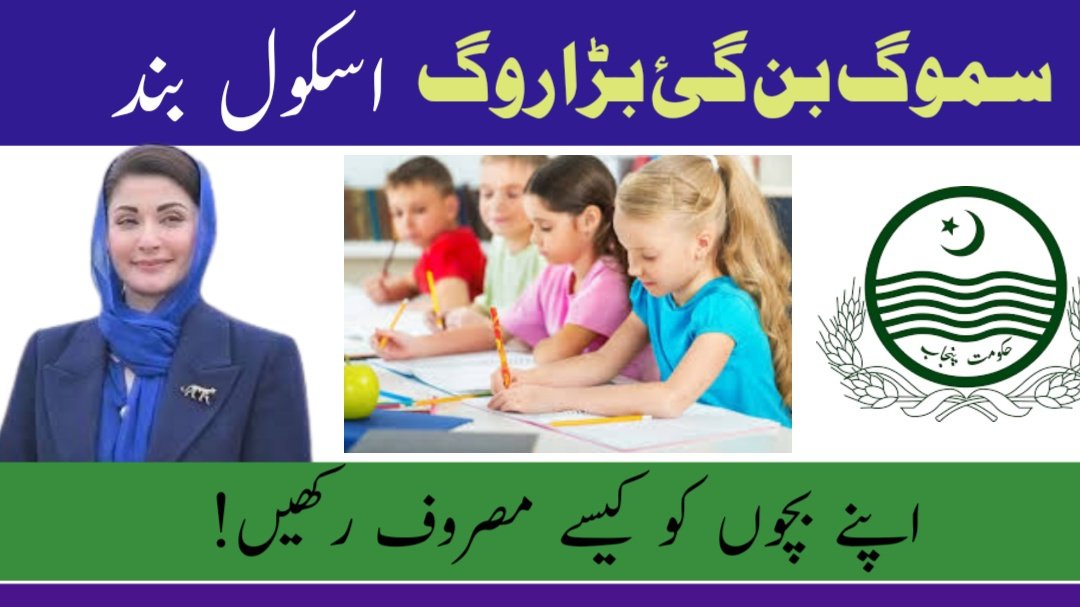Primary Schools
The Punjab government has announced a temporary closure of primary schools in Lahore due to the severe smog and hazardous air quality affecting the region. The smog levels have reached dangerously high, posing serious health risks, especially for children. This one-week school closure, targeting classes from playgroup to Class V, is meant to safeguard students’ health. Health and environmental experts have advised this decision as the best course of action to minimize children’s exposure to the harmful effects of smog. This article covers the reasons for this closure, the health impact of the smog, and the precautionary measures that citizens are being advised to take.
Reasons for School Closure
The main reason behind the school closure is the alarmingly high air quality index (AQI) in Lahore, which has exceeded safe levels. The AQI reading has crossed the hazardous threshold of 1000, leading air quality experts to voice concerns about the effects of pollution on children’s respiratory health. This situation is worsened by pollutants drifting in from neighboring areas, combined with local pollution sources such as traffic emissions, industrial smoke, and crop burning. In response, the government has determined that suspending primary school classes for a week is essential to protect children from the harmful effects of this pollution.

Impact of Smog on Health
Smog, which is a mixture of fine particulate matter and toxic gases, has multiple adverse health effects. Extended exposure to smog can lead to respiratory issues, eye irritation, and in extreme cases, worsen conditions like asthma and bronchitis. Young children are especially vulnerable due to their developing respiratory systems and their regular outdoor activities. Health experts have also warned that prolonged exposure to smog can impact children’s cognitive development and physical growth. Therefore, the government strongly advises parents to keep children indoors and avoid any outdoor activities during this period to reduce the potential health risks.
Government’s Preventive Measures
To address the hazardous air quality, the Punjab government is implementing several measures to combat the smog crisis. Steps include water sprinkling on roads to reduce dust, strict monitoring of vehicular emissions, and encouraging industrial units to control their smoke output. These initiatives aim to lower the concentration of harmful particles in the air. Additionally, the government has requested citizens to limit personal vehicle usage and adhere to pollution control guidelines, emphasizing that collective public cooperation is essential for effective results in reducing smog levels.
Public Safety Instructions
Authorities have issued safety guidelines to help citizens reduce the harmful effects of smog. People are encouraged to stay indoors, especially during peak smog hours, and use protective masks if they must go outside. Additional recommendations include staying hydrated, using air purifiers indoors, and keeping windows closed to prevent polluted air from entering homes. Parents are particularly advised to monitor their children’s exposure to outdoor air and be vigilant for any respiratory symptoms, seeking medical attention if necessary. Such precautions are crucial in reducing health risks during this period of extreme air pollution.
Also Read:Ehsaas Naujawan Rozgar and Apna Ghar Schemes Set for Launch by KPK Government 2024
Duration and Reassessment
The school closure is initially set for one week, after which the government will reevaluate the air quality to decide whether schools can safely reopen. This decision will be based on improvements in air quality readings and advice from health and environmental experts. If the smog persists, an extension of the closure may be considered. This cautious approach reflects the government’s commitment to public health, especially for vulnerable groups such as young students, while also balancing the need for continued education.
Importance of Public Cooperation
Public cooperation plays a vital role in controlling smog and protecting community health. By following government-issued guidelines and reducing activities that contribute to pollution, citizens can help lower smog levels. The government is also promoting environmentally friendly practices like carpooling and implementing stricter emission regulations for industries. Involving the community in these efforts is crucial for success, as individual contributions to reducing pollution collectively impact overall air quality.
Conclusion
The temporary closure of primary schools in Lahore due to severe smog levels highlights the government’s efforts to prioritize health and safety over routine activities. This proactive step is intended to protect young students from the harmful effects of pollution. Alongside various preventive measures, public cooperation is essential to control and decrease smog levels. By adhering to safety guidelines and adopting eco-friendly practices, citizens can help safeguard not only themselves but also the most vulnerable members of society, including children and the elderly.

